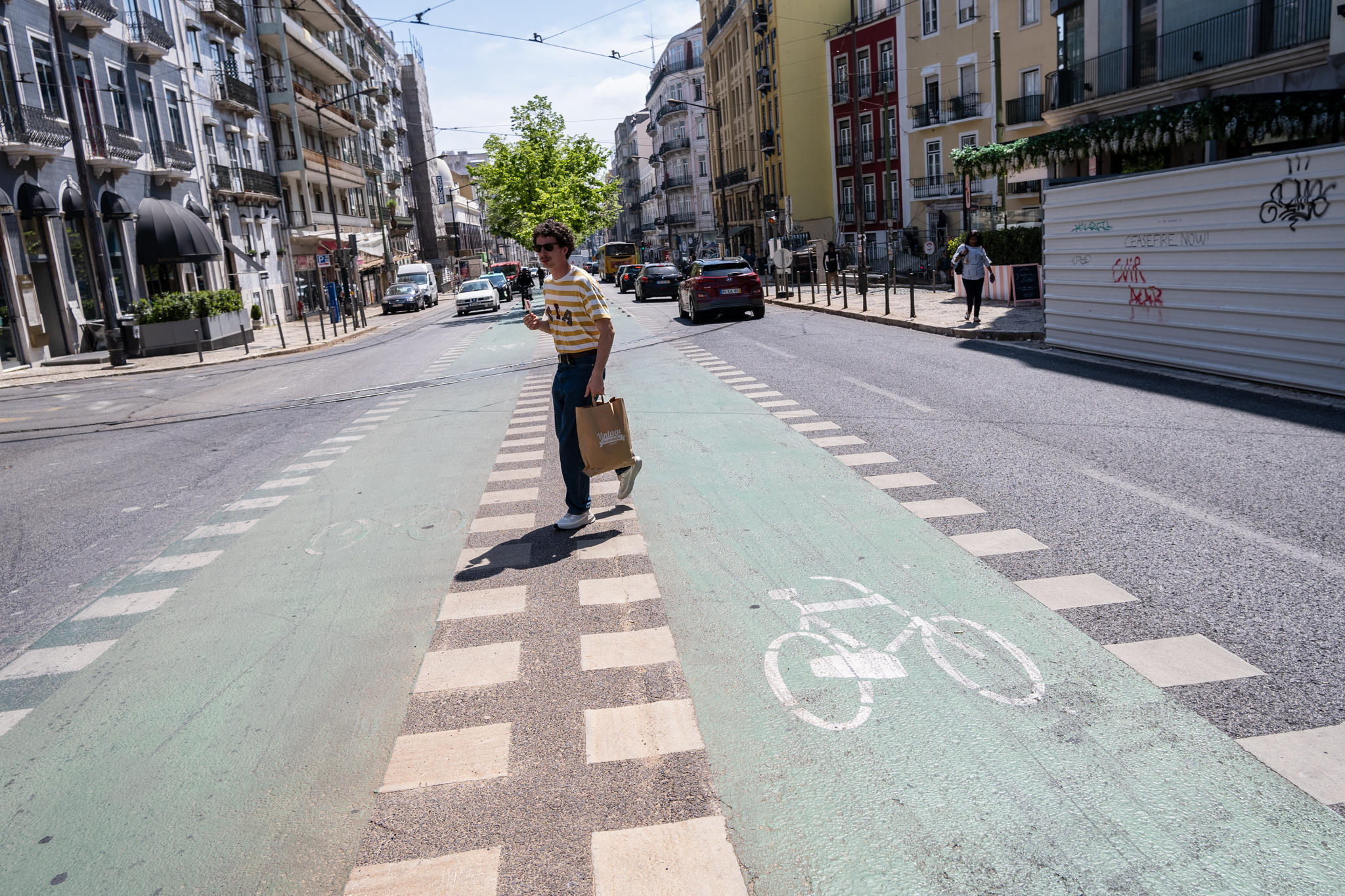
The MUBi association, which represents bicycle users, proposes six priority measures in this next State Budget, to accelerate the transition to a healthier, fairer and more sustainable urban mobility.

Unlike all other economic sectors, which have reduced emissions, in mobility and transport the emissions have been rising steadily for a decade and are now 60% higher in Portugal than they were in 1990. This is, since 2019, the sector with the largest weight (28%) in the country's emissions e responsible for 37% of final energy consumption. Road transport is by far the most important sub-sector and also the main cause of air pollution in cities.
To meet national and international commitments for climate action, Portugal will have to reduce transport emissions by at least 40% by 2030, compared to 2005 values. You will need we significantly reduce the number of cars in circulation and their usemainly in urban areas. By the end of the decade, active modes are expected to be the main commuting option for almost half of the Portuguese populationas stipulated in National Strategy for Active Cycling Mobility (ENMAC) 2020-2030 and the National Strategy for Active Pedestrian Mobility (ENMAP) 2030. By 2025, 4% of travel in Portuguese cities should be by bicycle, increasing to 10% by 2030
Achieving these goals requires redirecting public resources from the automobile to active and collective modes of travel and a major investment and effort by the State for a profound transformation of urban mobility in Portugal.
In cities, more than 30% of car trips cover distances of less than 3 km and 50% are less than 5 km. Many of these trips could be made in 15-20 minutes by bicycle or in 30-50 minutes on foot, if safe and comfortable conditions exist for the use of these modes. Supporting and encouraging active modes of travel is one of the easiest, fastest and most efficient ways for us to reduce dependence on fossil fuels and reduce pollutant and greenhouse gas emissions. At the same time, we are improve public health, the local economy and families, and the quality of urban life. The socio-economic benefits of cycling in the European Union are estimated at more than 150 billion euros per year. Of these, more than 90 billion represent positive externalities on the environment, health and mobility systems.
The cyclists produce 84% less CO2 emissions related to mobility than the non-cyclists. Whoever replaces the use of the car by the bicycle on weekdays - for example, on a 5 km journey between home and work in each direction - will reduce his carbon footprint by about one ton of CO2 at the end of the year, and also save 500 euros in fuel alone. If a family can do without an automobile, will save 4 thousand euros per yearon average, which you can use for your children's education, housing, culture or leisure activities, for example.
Nevertheless, the the difference in investments in active mobility with other European countries has been abysmal. For example, an Irish citizen knows that, until lunchtime, his country's government invested so much per capita in the active modes how much the State Budget for 2022 in Portugal has allocated to the National Strategy for bicycle mobility for a whole year!
Cycling and walking should be pillars of mobility policies and therefore also in budgetary instruments. MUBi advocates that at least 10% of the total transport sector budget is allocated to bicycle mobility and another 10% to pedestrian mode. The following section presents six priority measures for the 2023 State Budget, which will contribute to accelerating the transition to a healthier, fairer, more efficient and sustainable urban mobility.
The three technicians that the draft National Strategy for Active Pedestrian Mobility (ENMAP) 2030 designates for the coordination of strategies for bicycle mobility and pedestrian mobility are clearly insufficient. As an example, the government agency Active Travel England, which coordinates the implementation of national policies for active mobility in England, envisages hiring a staff constituted by about 100 people. This would be equivalent to hiring 20 people in Portugal to implement the two strategies.
One of the main constraints to the progress in the implementation of the ENMAC 2020-2030 has been the difficulty that many of the entities responsible for the measures have in understanding the purpose and objectives of the Strategy and the challenges, the necessary efforts, and the role they have to play in changing the mobility paradigm.
If, on the one hand, there needs to be active participation from all the governmental areas identified in ENMAC, which has not been the case, it is also essential and urgent to empower and train all the entities responsible for ENMAC and ENMAP measures in the areas of active and sustainable mobility.
The training and updating of technicians from municipalities, public institutes and other state bodies in the areas of active, inclusive and sustainable mobility and road citizenship is fundamental to promote changes in the current mobility patterns.
For example, the Republic of Ireland will hire 248 technicians to work in the area of active mobility in local and regional administrations and to assist in the proper implementation of investments: "The new hires will be dedicated to activating and promoting active travel in Ireland and will work in design, communications/community relations and construction supervision roles."
This program should contain legal, financial and organizational measures to help build capacity and implement Sustainable Urban Mobility Plans (PMUS) in accordance with the European PMUS guidelines, as proposed by the European Commission in the New EU Framework for Urban Mobility.
UMPs are strategic instruments designed to meet the mobility needs of people and businesses in cities and agglomerations for a better quality of life. They are based on existing planning practices and take into account the principles of integration, participation and evaluation. UMPs can also help to remedy the many mistakes made in Portugal in the use of EU funding aimed at reducing urban car use and encouraging a shift to active and more sustainable modes.
The European Commission will "publish, by the end of 2022, a Recommendation from the Commission to Member States on the national programme to support regions and cities in implementing effective sustainable urban mobility plans. This will include an enhanced concept for SUMPs, setting out clear priorities to favor sustainable solutions, including public, collective and active transportationand shared mobility (including for connections between urban and rural areas), fully integrating resilience aspects, as well as sustainable urban logistics plans (SULP), based on zero-emission vehicles and solutions"..
This program should support the implementation of physical measures for traffic calming, zones 30 and coexistence, especially around schools, residential areas, urban centers and other places where vulnerable users coexist with motorized vehicles. It should also support the creation of networks of safe routes for bicycle use (cycling networks), respecting international best practices, redistributing road space on urban and interurban arterials and articulating with major public transport facilities and interfaces.
Investment in safe and quality cycling infrastructure plays a major role in increasing the use of this mode of transport for everyday travel as an alternative to the individual car, and has very favorable cost-benefit ratios.
In Spain, in 2021 the Government adjudicated 1 billion from the Recovery and Resilience Plan to municipalities to implement Reduced Emission Zones with a focus on active mobility and public transport in urban centers. Some 400 million have been awarded directly to improve the conditions for the use of active modes in urban areas: 243 million to increase pedestrian space in cities; 100 million to build 500 km of new urban bicycle paths and improve at least 450 km of existing ones, and 49 million to finance the implementation of public bicycle sharing systems. The Spanish Government openedin 2022, tender for another 500 million, totaling 1500 million in this line of action.
The incentives to support the purchase of bicycles (which should be continued and expanded[1]) have been fundamental, but programs are now needed to encourage the use of the bicycle as a mode of transportation. This type of program, rewarding financially the kilometers cycled, has a great potential in the effective modal transfer from car to bicycle in the daily travels. They exist in several European countries and have been proven to result in an excellent positive return for society, namely in terms of public health and also, therefore, in reducing work absenteeism.
The French program - l'Indemnité Kilométrique Vélo - which began in 2015, rewards workers €0.25 per kilometer cycled, up to a maximum annual value of 200 euros. In the Netherlands, workers can now rent a bicycle for 7 euros a month, and are rewarded with 0.17 euros for each kilometer cycled. The Belgian program has been in existence since 1999, rewards workers €0.23 per kilometer, and more than 500 thousand people participate in itThis is about 11% of the country's labor force.
This type of program should be associated with mandatory Mobility and Transportation Plans for employment sites with more than 300 people, with priority and example for state-run sites. In Energy Saving Plan 2022-2023the Government recommends that the private sector "adoption of sustainable mobility plans for entities or with more than 100 employees at the same location"but it would be unacceptable if the Public Administration, central and local, did not lead by example in this process.
Compared to programs in other countries, MUBi estimates that it would take around 6 million Euros - the equivalent of two days' reduction in the Tax on Petroleum Products (ISP) - for the first year of such a program in Portugal.
It makes no sense that those who fuel their cars with fossil fuels pay an ISP rate equivalent to the reduction in the VAT rate to 13%, while those who buy a bicycle continue to pay the maximum VAT rate of 23%.
A new European VAT directive now allows member states to apply the reduced VAT rate to bicycles, both conventional and electric. Last October, the Portuguese Parliament decided, with a large majority of votes in favor, to recommend that the Government study the possibility of apply the reduced VAT rate of 6% to bicycles as of 2022.
This measure will cost, per year, less than the ISP reduction costs, per week, to the Portuguese State. Unlike motorized vehicles, bicycle use generates significant positive externalities, namely in terms of public health, which would far outweigh the costs of the VAT reduction we are proposing. This measure would be particularly important as an incentive to the acquisition of electric and cargo bicycles, whose prices are considered high by many Portuguese and have been an obstacle to their purchase and adoption. At the same time, the application of this measure would help the Portuguese bicycle industry, which directly employs close to 9 thousand people and indirectly around 30 thousand e is responsible for producing more bicycles than any other European country.
[1] MUBi believes that the Environmental Fund contribution for bicycles should increase to 60% and, given the price increase, the maximum value of the incentives should increase by approximately 33%. Thus, we propose:
- Electric Bicycles: Support from 60% up to €650, for a total of 6000 units.
- Cargo bikes: Support from 60% up to EUR 1350 for unassisted bikes, and up to EUR 2000 for electrically assisted cargo bikes, for a total of 400 units.
- Conventional bicycles: Support from 60% up to 250 euros, for a total of 6000 units.
- Extension of support to kits conversion to electric bicycles and to bicycles adapted for people with special needs.


